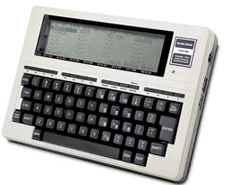 There’s something (mildly) magical about the idea of a computer that sells for $100. It captured the imagination back in 1982, when Timex introduced this one. People still call the OLPC XO a “$100 laptop” (plug: we’re giving one away) even though OLPC hasn’t yet ground the price down to $100. And now RadioShack–who some of us former still TRS-80 groupies think of as “The Biggest Name in Little Computers”–is selling Acer’s Aspire One netbook for $99.99.
There’s something (mildly) magical about the idea of a computer that sells for $100. It captured the imagination back in 1982, when Timex introduced this one. People still call the OLPC XO a “$100 laptop” (plug: we’re giving one away) even though OLPC hasn’t yet ground the price down to $100. And now RadioShack–who some of us former still TRS-80 groupies think of as “The Biggest Name in Little Computers”–is selling Acer’s Aspire One netbook for $99.99.
Yes, there’s a catch. It’s the same one that every cell phone carrier uses to drive down the alleged price of most of their phones: The ‘Shack is offering the Aspire at $99.99 only if you sign up for a two-year contract for AT&T 3G wireless service at a minimum of $60 a month. (The netbook has 3G capability built in.) In other words, you’re commiting to a total expenditure of $1539.99 (before taxes) over two years to get a computer for a penny under a hundred bucks.
Just how much do you save on the Aspire by signing that two year contract? RadioShack is selling the netbook at an unsubsidized price of $499.99. That seems a tad pricey given that a similarly-equipped Aspire (except without 3G) goes for $380 elsewhere.
My instinctive reaction to the ‘Shack’s deal is the same one I have to almost all ones that involve subsidizing an immediate purchase with a long-term contractual obligation to pay a fixed monthly service price: Don’t do it. The price of 3G service will likely fall, and relationships with wireless carriers tend to be better when you can cheerfully call them up and tell them you’re planning to dump them immediately for a competitor. (In addition, AT&T 3G coverage remains spotty–going online with the Aspire won’t be much fun at all if you happen to be in a neighborhood where you can only connect at EDGE speed.)
Of course, the utter universality of two-year contract pricing in the phone world proves without a doubt that the average American is willing to do the deal, rightly or wrongly. So I think it’s possible that these Aspires will fly off of RadioShack’s shelves. And I’m curious to see if other electronics merchants will roll out their own “$100 netbook” offers.
Would you take the bait?
(Image of TRS-80 Model 100 from OldComputers.net)
